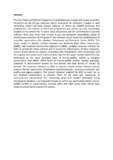Please use this identifier to cite or link to this item:
https://cris.library.msu.ac.zw//handle/11408/1075| Title: | Connecting people with wildlife: lessons from selected education and conservation projects of Zimbabwe | Authors: | Matsa, Mark | Keywords: | Land Reforms Midlands Black Rhino Wildlife Conser vation. |
Issue Date: | 2014 | Publisher: | Sacha And Diamond Academic Publishers | Series/Report no.: | African Journal Of Social Sciences;Vol. 4. no.1 | Abstract: | The Fast-Track Land Reform Programme in Zimbabwe was a major and unique economic revolution on the African continent which accounted for milestone changes in land ownership, which had been skewed infavour of whites by colonial processes and programmes. The manner in which the programme was carried out was emotionally charged to the extent that in many cases ecosystems and the environment in general suffered. Once over, there was a need to put environmental sustainability ahead of revolutionary emotions for the good of ‘our common future’ hence the establishment of custodian organisations like Sebakwe Conservancy and Education Centre (SCEC). This study sought to identify conflicts between the Midlands Black Rhino Conservancy (MBRC) and resettled communities adjacent to MBRC, establish measures initiated by SCEC to ameliorate these conflicts and to assess the effectiveness of these measures. Lecture presentations by expects, interviews with beneficiaries, field observation and focus group discussions were used to collect data for this paper. Results identified crop destruction as the most prevalent form of human-wildlife conflict in Sebakwe communities near MBRC. Other forms of human-wildlife conflict included poaching, predation of domesticated animals by wild animals and fatal attacks of humans by animals. The measures initiated by SCEC to improve human-animal relations include projects like the tsotso stove, Chipembere nutritional garden, education incentives and poultry and piggery projects. This ‘project initiative’ enabled the SCEC to reach out to the resettled communities to consents them on the need and importance of environmental conservation. The ‘connecting peoplewith wildlife’ philosophy being employed at Sebakwe is an important innovation, which can significantly reduce human-wildlife conflict in conservancies, national parks and safari areas under threat from newly resettled farmers across the country. | URI: | http://citeseerx.ist.psu.edu/viewdoc/download;jsessionid=C3E222043DA1EEBC93429BD5B2D2CB8C?doi=10.1.1.431.2440&rep=rep1&type=pdf | ISSN: | 2045-8452 |
| Appears in Collections: | Research Papers |
Files in This Item:
| File | Description | Size | Format | |
|---|---|---|---|---|
| ABSTRACT Connecting people with wildlife.pdf | 291.26 kB | Adobe PDF |  View/Open |
Page view(s)
172
checked on Mar 3, 2026
Download(s)
48
checked on Mar 3, 2026
Google ScholarTM
Check
Items in MSUIR are protected by copyright, with all rights reserved, unless otherwise indicated.



